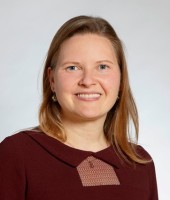Margarita Boenig-Lipstin
Margarita (Margo) Boenig-Liptsin is a tenure-track Assistant Professor for Ethics, Technology and Society in the Department of Humanities, Social and Political Sciences at ETH Zürich, Switzerland. She trained in the field of Science, Technology and Society with Prof. Sheila Jasanoff in the Harvard STS Program. She holds a PhD in History of Science (Harvard University) and in Philosophy (Université Paris-Sorbonne, under the supervision of Prof. Bernadette Bensaude-Vincent). Her research focuses on transformations to human identity and citizenship in relation to information technologies across time and cultures, and the implications of these changes for ethical life in technological societies.
In January 2024, she joins the IAS for a one-month writing residency.
Research Interets
Digital, data, computing, and AI ethics; history of computing; ethics, justice and human rights in technological societies; citizenship and democracy.
Science, society and the human: Emergence of a constitutional model of the human in 1980s STS
From the mid-1970s to the 1990s, scholars from different disciplines converged on the idea that human subjectivity and modes of thinking, knowing, and acting take place in dynamic interaction with other people, artifacts, and environments. This way of conceptualizing the human as a being that is constituted by and constituting—in both the ontological and normative-legal senses of the term—knowledge and technological practices, became particularly important in the new field of Science, Technology and Society (STS). The project will first define the concept of "constitutions of the human" today with examples of how technologies make-up people in their ways of being (bodily practice, habitual actions, forms of reasoning) and inform the norms according to which people live. Second, the project aims to trace the history of the constitutional model of the human to the formative texts (of Sheila Jasanoff, Bruno Latour, Michel Callon, Donna Haraway, and Ian Hacking) and contexts (research on the problems of the human condition in advanced scientific and technological societies) of the emerging field of STS in the 1980s. Pioneering STS scholars offered their re-thinking of the human to help restructure social institutions to support democratic life in light of growing awareness of the environmental and political risks of nuclear weapons, industrial chemicals, bioengineering, and information technologies. We can benefit from renewed attention to the constitutions of the human in light of digital and environmental transformations today.
Key publications
Boenig-Liptsin, M. 2022. "Aiming at the Good Life in the Datafied World : A co-productionist framework of ethics", Big Data and Society. https://doi.org/10.1177/20539517221139782
Boenig-Liptsin, M., A. Tanweer, A. Edmundson. 2022. "Interplay of ethical thinking and data science practice", Journal of Statistics and Data Science Education. https://doi.org/10.1080/26939169.2022.2089411
Boenig-Liptsin, M. et J. Benjamin Hurlbut. 2016. "Technologies of Transcendence and the Singularity University", Perfecting Human Futures : Innovation, Secularization and Eschatology, ed. J. Benjamin Hurlbut et Hava Tirosh-Samuelson. Dordrecht : Springer.
|
New session of the "Paris IAS Ideas" talk series, with the participation of Margarita Boenig-Lipstin (ETH Zurich, Switzerland) / Paris IAS Fellow |
|
|



